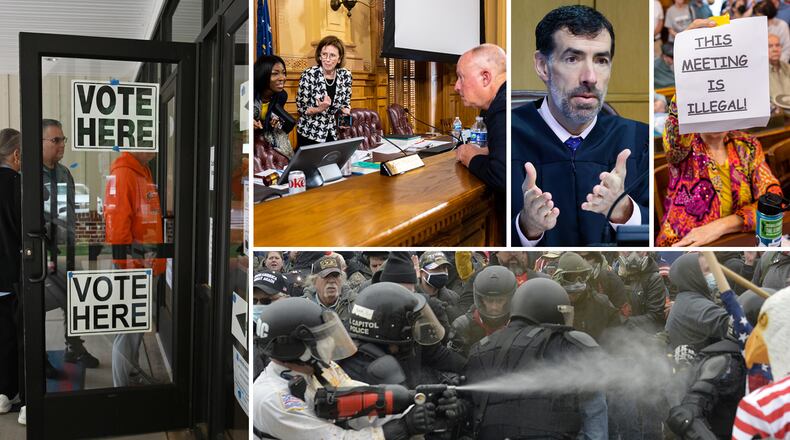Since Donald Trump tried to reverse his loss in the 2020 presidential election, many avenues to challenge the results in Georgia have been blocked.
A court upheld a Georgia law this week requiring county election boards to certify the winner. Two more rulings called off a new hand count that critics said could have caused election night delays and distrust. And a 2022 federal law makes it harder to object to the results in Congress.
But a losing candidate could still try to overturn this year’s election, legal experts say.
They say postelection disputes are likely if the race is as close as in 2020, when Trump and his supporters filed scores of unsuccessful lawsuits in Georgia and other swing states, and a mob of Trump supporters stormed the U.S. Capitol on Jan. 6, 2021, as Congress ratified states’ electoral votes.
Election attorneys doubt lawsuits, protests and other postelection maneuvers will stop the winning candidate — whether it’s Trump or Kamala Harris — from being sworn in as president Jan. 20.
“You can file lawsuits. You can try to have election officials ignore results. You can try to have Congress object, and so forth,” University of Notre Dame law professor Derek Muller said. “But the mechanisms we have are strong and resilient.”
But some worry Trump could undermine confidence in the result if he loses, as he did in 2020. That potentially could spark more violence.
“The biggest fear I have is not that the loser will take office,” said David Becker, a former U.S. Justice Department attorney who is now executive director of the Center for Election Innovation and Research, which works with election officials to promote voter confidence. “It’s that there will be a lot of anger and potentially violence.”
A risk averted?
Much of the attention this year has focused on the authority of local election boards, which certify the results. Although a judge this week reinforced Georgia’s law requiring boards to certify elections, they still have a vote.
One week after Election Day, every county election board will vote on whether to certify vote totals, a step in the process to make results official.
Some election board members could still vote no, even though Fulton Superior Court Judge Robert McBurney told them ahead of time in this week’s ruling that they can’t legally do so.
Credit: Miguel Martinez-Jimenez
Credit: Miguel Martinez-Jimenez
At least 19 election board members have voted against certifying elections since the 2020 election — most of them Republicans who doubted the accuracy of results, according to an investigation The Atlanta Journal-Constitution conducted this summer.
While those dissenters haven’t achieved a majority to reject certification, Republicans argued in court this month that they have the right to do so.
A judge this week struck down the State Election Board’s precertification rules requiring a “reasonable inquiry” and access to troves of election documents before certification. Critics said the rules could be used as a pretense to oppose finalizing the vote count.
If a county refused to certify the election as required by state law, the courts would be asked to compel them to do their duty, said Peter Simmons of Protect Democracy, an organization focused on advocacy against authoritarianism.
“It’s important not to panic because we do have these guardrails in place,” said Simmons, an attorney and policy strategist. “The courts will likely recognize the urgency of the situation and do everything in their power, while observing due process, to ensure proceedings are concluded in a timely manner.”
Muller, the Notre Dame professor, said worries about the upcoming election are overblown. He decried what he called “election disaster porn” from liberal groups and the news media and said predictions of disaster have become fundraising tools.
“There’s a lot of money to be raised in fear,” Muller said.
Election Day may not be the end
In a close election, losing candidates and their supporters likely would turn to the courts.
Georgia Republican Party Chair Josh McKoon said the GOP is prepared to pursue legal remedies if needed to ensure the election is fair.
“If we believe the laws and processes are good, we shouldn’t be afraid of a recount and we shouldn’t be afraid of someone making a lawful contest if they have a good-faith basis to do so,” McKoon said. “A lot of people are working very hard to ensure that whatever the outcome is, we’re able to say: ‘This is not a mess. This is a process we have confidence in.’ ”
Credit: Seeger Gray/AJC
Credit: Seeger Gray/AJC
Besides court fights over whether to certify the election, candidates could file lawsuits similar to those brought by Trump after the 2020 election, which made unsubstantiated allegations of ineligible voters, election equipment problems and fraud.
Trump voluntarily dismissed his lawsuits in Georgia, and investigators found no evidence to support his claim that the election was stolen.
He also requested a recount, which is allowed in Georgia when the margin is less than half a percentage point. But the recount and audit showed that Trump lost to Joe Biden by a similar amount as in the initial count.
While investigations since 2020 have exposed errors in the audit and the recount in Fulton County, such as double-scanned ballots, those problems didn’t change the result and fraud was never proved.
It’s not just Republicans who have challenged election outcomes in Georgia.
Stacey Abrams, a Democrat, also refused to concede and sued after her loss to Republican Brian Kemp by 55,000 votes in 2018. Abrams won court rulings to verify and count additional absentee ballots, while Trump’s allegations of fraud in the 2020 election were dismissed.
Counting all votes during certification
There’s no question that Georgia law requires county election boards to certify results, but Republicans say there’s room for dissent.
At court hearings this month, McBurney asked the assembled partisan and government lawyers whether they believed state law requires local election boards to certify the November vote tallies by 5 p.m. Nov. 12. Every lawyer said “yes.”
But Richard Lawson, a lawyer for the Trump-aligned America First Policy Institute, offered a caveat. If local board members believed there were problems with results in some precincts, they could vote to certify some precincts but not all of them, he said.
Lawson’s claim set off alarm bells among observers who worry Trump supporters on county election boards could discard valid votes in Democratic precincts to tip the election to the former president.
But McBurney rejected that idea in his ruling.
He found that nothing in law gives county election boards authority to omit precincts tainted by potential miscounts or fraud. He wrote that basic tabulation errors can be corrected, but concerns about large-scale problems should be reported to authorities and can be the basis for candidates to file an election contest in court after certification.
“There are no exceptions. While the superintendent must investigate concerns about miscounts and must report those concerns to a prosecutor if they persist after she investigates, the existence of those concerns, those doubts and those worries is not cause to delay or decline certification,” McBurney wrote.
Even after judges uphold the certification of elections and reject other claims, there are many other milestones before the next president is sworn in Jan. 20.
From Bush v. Gore to the ECRA
Candidates can appeal election results through the courts, potentially reaching the U.S. Supreme Court. After the 2000 election between Republican George W. Bush and Democrat Al Gore, the Supreme Court stopped a recount of disputed ballots in Florida, effectively awarding the state’s electoral votes and the presidency to Bush.
And there’s also the possibility that states’ votes in the Electoral College could be challenged, similar to the 2020 election between Biden and Trump. But this time, a new federal law makes it more difficult for objections to survive in Congress.
The Electoral Count Reform Act passed in 2022 raises the standard to make objections in Congress to a state’s slate of electors to one-fifth of both the House and Senate. Previously, one representative and one senator could make an objection. Each chamber would need a majority to sustain an objection, both before and after the 2022 law.
Credit: TNS
Credit: TNS
At every step of the vote-counting process, there are ways for a losing candidate to object, cry fraud, attempt to disqualify votes or try to count more votes.
Attempts to overturn the 2020 election included both court cases and a plan to nominate alternate Republican electors from Georgia and other states whose electoral count votes went to Biden. Trump and his allies pressed Vice President Mike Pence to overturn the results by selecting alternate slates of electors from Georgia and other states. Pence refused. That attempt later became the focus of pending criminal charges against Trump in Georgia and Washington, D.C.
The new law clarifies that the vice president’s role in counting electoral votes is “solely ministerial,” along with several other provisions to ensure that state’s electoral votes are counted.
While a losing candidate could attempt to reverse their defeat, they’d be unlikely to succeed, said Jason Torchinsky, a Republican election attorney.
“The closer the election, the more scrutiny there’s going to be,” Torchinsky said. “Postelection court challenges are extremely hard to succeed on. There’s an extremely high bar.”
A prelude to violence?
But the prospect of the losing candidate taking office on Jan. 20 is not the only concern. Distrust of the election system has fueled threats of violence against election workers and a political climate that has led to two assassination attempts on Trump himself.
One ominous sign: Some people made threats in response to McBurney’s ruling that county election officials cannot stop the certification of results, writing “hang him!!!” and “I smell civil war” on a right-wing channel on the messaging app Telegram.
Given the Jan. 6 attack on the U.S. Capitol, Muller said violence is a worry. But he said that attack followed a tumultuous year of COVID-19 lockdowns, police shootings and racial unrest. He’s more hopeful that the transition to the next presidential administration will be peaceful this year.
Others are more worried.
Credit: TNS
Credit: TNS
Lori Ringhand, a constitutional law professor at the University of Georgia, said distrust in the election system has created “opportunities for people who want to make mischief with the results.” She said even unsuccessful efforts to undermine an election have consequences.
“We are dealing with systems that have worked for more than 100 years,” Ringhand said. “They do, though, depend on a certain degree of shared good faith in respecting the process and respecting the outcome. Law can’t necessarily take the place of that good-faith confidence in the processes.”
“The grave concern, long term, is that we lose confidence in elections to peacefully transfer power,” she said. “That doesn’t end well.”
Key dates in Georgia for election
Nov. 5: Election Day
Nov. 8: Overseas and military ballots are due. Last day for absentee voters to cure ballots if they failed to sign the oath or information doesn’t match
Nov. 12: Deadline for counties to certify elections
Nov. 22: Deadline for Secretary of State Brad Raffensperger to certify statewide results
Dec. 17: Electors for the winning presidential candidate meet in the Georgia Capitol to record their votes
Jan. 6: Congress meets to count Electoral College votes. The winning candidate needs 270 electoral votes
Jan. 20: Inauguration Day
Keep Reading
The Latest
Featured










